Strategic Hospitality Management (Pass Criteria)
VerifiedAdded on 2023/06/10
|14
|4352
|494
AI Summary
This report discusses the theories of strategic management in the hospitality industry, cross-cultural challenges faced by hospitality businesses, and generic strategies for hospitality businesses. It also includes an internal and external environment analysis of hospitality organizations and the difference between corporate, business, and operational strategies.
Contribute Materials
Your contribution can guide someone’s learning journey. Share your
documents today.
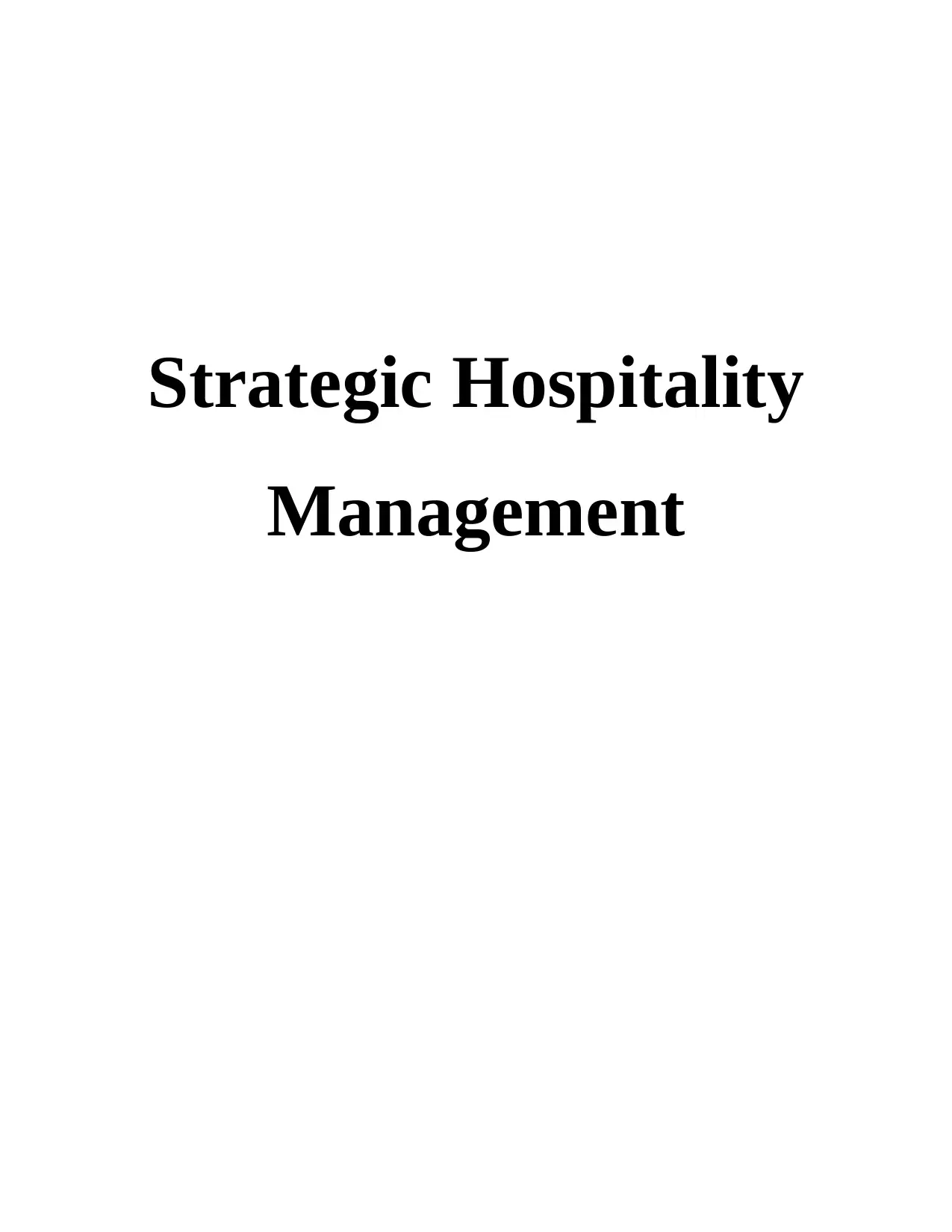
Strategic Hospitality
Management
Management
Secure Best Marks with AI Grader
Need help grading? Try our AI Grader for instant feedback on your assignments.
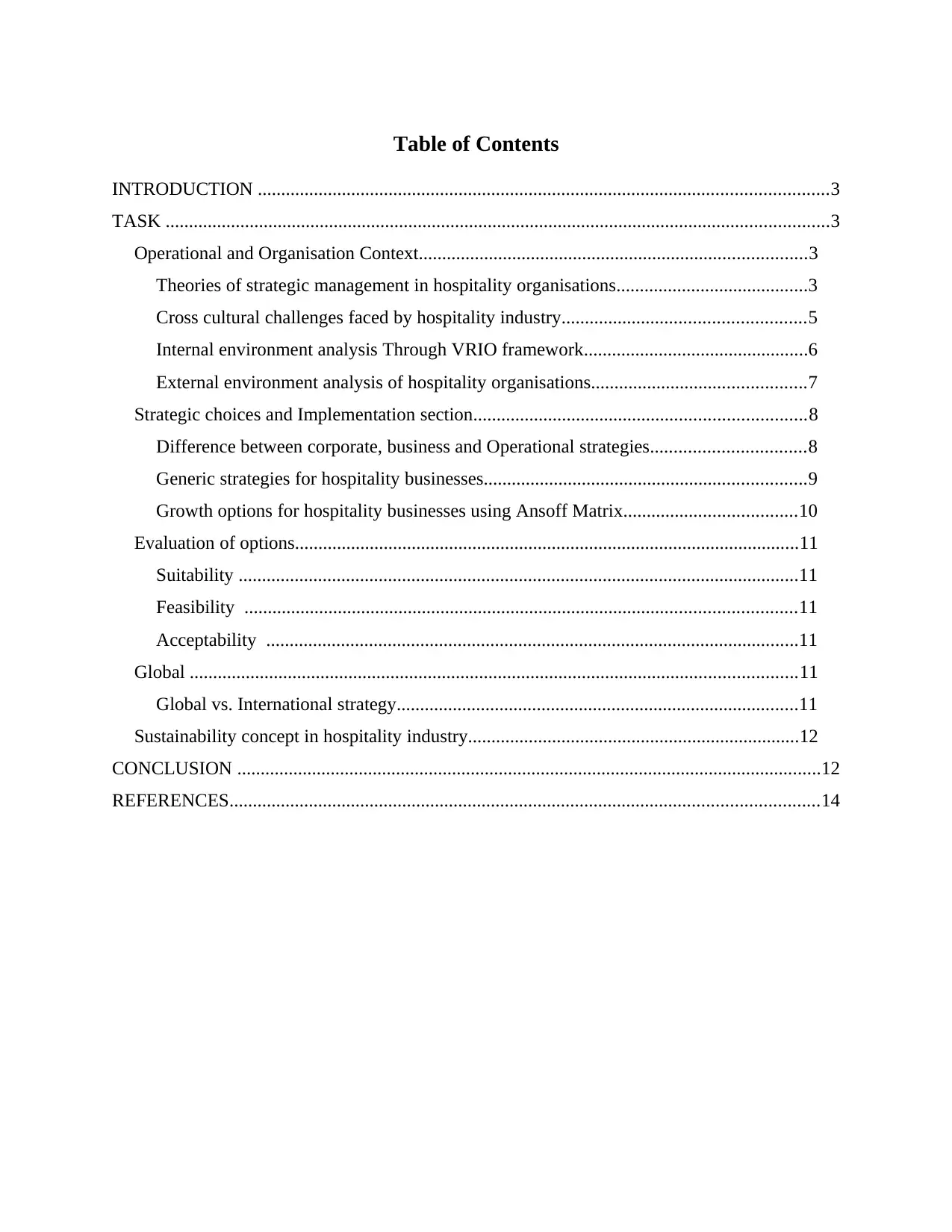
Table of Contents
INTRODUCTION ..........................................................................................................................3
TASK ..............................................................................................................................................3
Operational and Organisation Context...................................................................................3
Theories of strategic management in hospitality organisations.........................................3
Cross cultural challenges faced by hospitality industry....................................................5
Internal environment analysis Through VRIO framework................................................6
External environment analysis of hospitality organisations..............................................7
Strategic choices and Implementation section.......................................................................8
Difference between corporate, business and Operational strategies.................................8
Generic strategies for hospitality businesses.....................................................................9
Growth options for hospitality businesses using Ansoff Matrix.....................................10
Evaluation of options............................................................................................................11
Suitability ........................................................................................................................11
Feasibility ......................................................................................................................11
Acceptability ..................................................................................................................11
Global ..................................................................................................................................11
Global vs. International strategy......................................................................................11
Sustainability concept in hospitality industry.......................................................................12
CONCLUSION .............................................................................................................................12
REFERENCES..............................................................................................................................14
INTRODUCTION ..........................................................................................................................3
TASK ..............................................................................................................................................3
Operational and Organisation Context...................................................................................3
Theories of strategic management in hospitality organisations.........................................3
Cross cultural challenges faced by hospitality industry....................................................5
Internal environment analysis Through VRIO framework................................................6
External environment analysis of hospitality organisations..............................................7
Strategic choices and Implementation section.......................................................................8
Difference between corporate, business and Operational strategies.................................8
Generic strategies for hospitality businesses.....................................................................9
Growth options for hospitality businesses using Ansoff Matrix.....................................10
Evaluation of options............................................................................................................11
Suitability ........................................................................................................................11
Feasibility ......................................................................................................................11
Acceptability ..................................................................................................................11
Global ..................................................................................................................................11
Global vs. International strategy......................................................................................11
Sustainability concept in hospitality industry.......................................................................12
CONCLUSION .............................................................................................................................12
REFERENCES..............................................................................................................................14
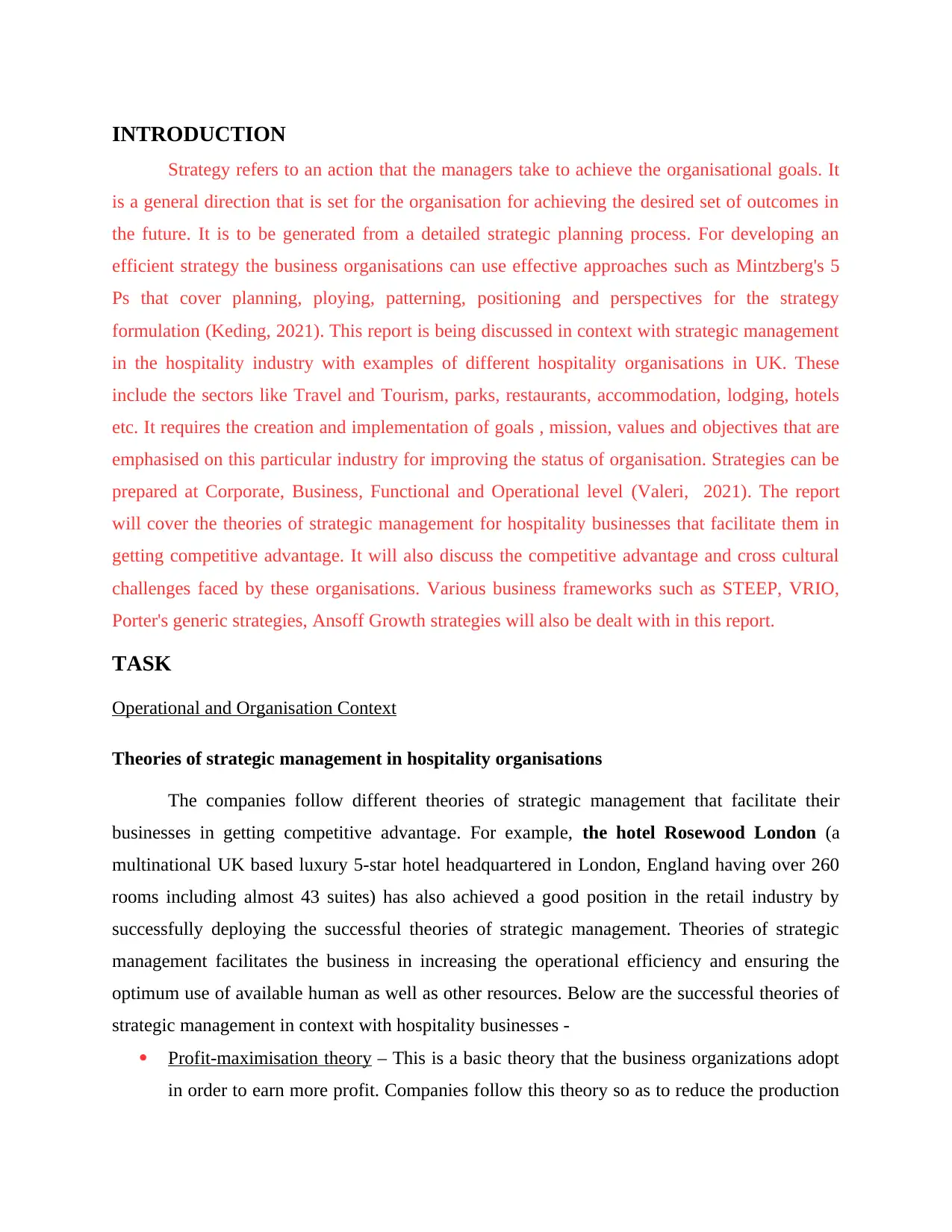
INTRODUCTION
Strategy refers to an action that the managers take to achieve the organisational goals. It
is a general direction that is set for the organisation for achieving the desired set of outcomes in
the future. It is to be generated from a detailed strategic planning process. For developing an
efficient strategy the business organisations can use effective approaches such as Mintzberg's 5
Ps that cover planning, ploying, patterning, positioning and perspectives for the strategy
formulation (Keding, 2021). This report is being discussed in context with strategic management
in the hospitality industry with examples of different hospitality organisations in UK. These
include the sectors like Travel and Tourism, parks, restaurants, accommodation, lodging, hotels
etc. It requires the creation and implementation of goals , mission, values and objectives that are
emphasised on this particular industry for improving the status of organisation. Strategies can be
prepared at Corporate, Business, Functional and Operational level (Valeri, 2021). The report
will cover the theories of strategic management for hospitality businesses that facilitate them in
getting competitive advantage. It will also discuss the competitive advantage and cross cultural
challenges faced by these organisations. Various business frameworks such as STEEP, VRIO,
Porter's generic strategies, Ansoff Growth strategies will also be dealt with in this report.
TASK
Operational and Organisation Context
Theories of strategic management in hospitality organisations
The companies follow different theories of strategic management that facilitate their
businesses in getting competitive advantage. For example, the hotel Rosewood London (a
multinational UK based luxury 5-star hotel headquartered in London, England having over 260
rooms including almost 43 suites) has also achieved a good position in the retail industry by
successfully deploying the successful theories of strategic management. Theories of strategic
management facilitates the business in increasing the operational efficiency and ensuring the
optimum use of available human as well as other resources. Below are the successful theories of
strategic management in context with hospitality businesses -
Profit-maximisation theory – This is a basic theory that the business organizations adopt
in order to earn more profit. Companies follow this theory so as to reduce the production
Strategy refers to an action that the managers take to achieve the organisational goals. It
is a general direction that is set for the organisation for achieving the desired set of outcomes in
the future. It is to be generated from a detailed strategic planning process. For developing an
efficient strategy the business organisations can use effective approaches such as Mintzberg's 5
Ps that cover planning, ploying, patterning, positioning and perspectives for the strategy
formulation (Keding, 2021). This report is being discussed in context with strategic management
in the hospitality industry with examples of different hospitality organisations in UK. These
include the sectors like Travel and Tourism, parks, restaurants, accommodation, lodging, hotels
etc. It requires the creation and implementation of goals , mission, values and objectives that are
emphasised on this particular industry for improving the status of organisation. Strategies can be
prepared at Corporate, Business, Functional and Operational level (Valeri, 2021). The report
will cover the theories of strategic management for hospitality businesses that facilitate them in
getting competitive advantage. It will also discuss the competitive advantage and cross cultural
challenges faced by these organisations. Various business frameworks such as STEEP, VRIO,
Porter's generic strategies, Ansoff Growth strategies will also be dealt with in this report.
TASK
Operational and Organisation Context
Theories of strategic management in hospitality organisations
The companies follow different theories of strategic management that facilitate their
businesses in getting competitive advantage. For example, the hotel Rosewood London (a
multinational UK based luxury 5-star hotel headquartered in London, England having over 260
rooms including almost 43 suites) has also achieved a good position in the retail industry by
successfully deploying the successful theories of strategic management. Theories of strategic
management facilitates the business in increasing the operational efficiency and ensuring the
optimum use of available human as well as other resources. Below are the successful theories of
strategic management in context with hospitality businesses -
Profit-maximisation theory – This is a basic theory that the business organizations adopt
in order to earn more profit. Companies follow this theory so as to reduce the production
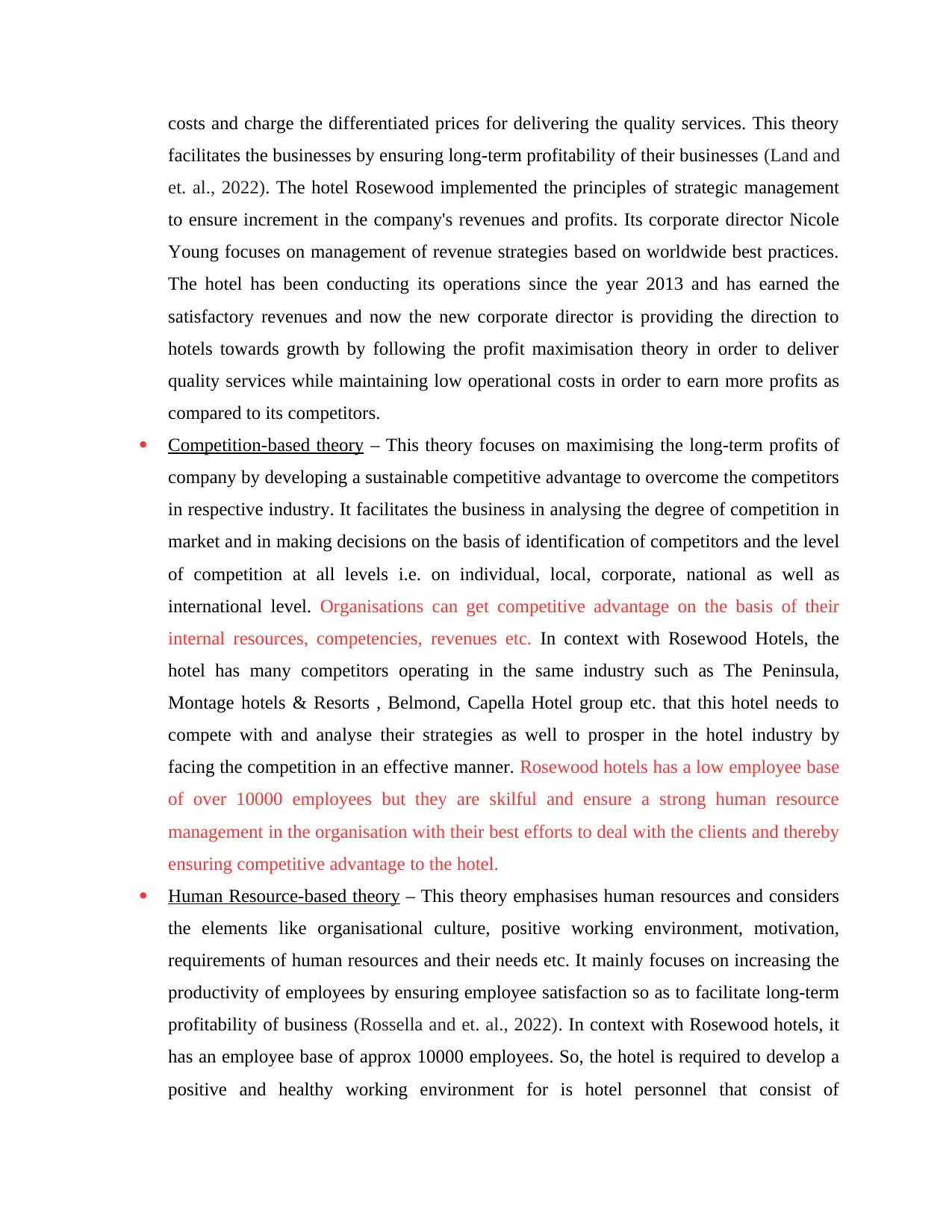
costs and charge the differentiated prices for delivering the quality services. This theory
facilitates the businesses by ensuring long-term profitability of their businesses (Land and
et. al., 2022). The hotel Rosewood implemented the principles of strategic management
to ensure increment in the company's revenues and profits. Its corporate director Nicole
Young focuses on management of revenue strategies based on worldwide best practices.
The hotel has been conducting its operations since the year 2013 and has earned the
satisfactory revenues and now the new corporate director is providing the direction to
hotels towards growth by following the profit maximisation theory in order to deliver
quality services while maintaining low operational costs in order to earn more profits as
compared to its competitors.
Competition-based theory – This theory focuses on maximising the long-term profits of
company by developing a sustainable competitive advantage to overcome the competitors
in respective industry. It facilitates the business in analysing the degree of competition in
market and in making decisions on the basis of identification of competitors and the level
of competition at all levels i.e. on individual, local, corporate, national as well as
international level. Organisations can get competitive advantage on the basis of their
internal resources, competencies, revenues etc. In context with Rosewood Hotels, the
hotel has many competitors operating in the same industry such as The Peninsula,
Montage hotels & Resorts , Belmond, Capella Hotel group etc. that this hotel needs to
compete with and analyse their strategies as well to prosper in the hotel industry by
facing the competition in an effective manner. Rosewood hotels has a low employee base
of over 10000 employees but they are skilful and ensure a strong human resource
management in the organisation with their best efforts to deal with the clients and thereby
ensuring competitive advantage to the hotel.
Human Resource-based theory – This theory emphasises human resources and considers
the elements like organisational culture, positive working environment, motivation,
requirements of human resources and their needs etc. It mainly focuses on increasing the
productivity of employees by ensuring employee satisfaction so as to facilitate long-term
profitability of business (Rossella and et. al., 2022). In context with Rosewood hotels, it
has an employee base of approx 10000 employees. So, the hotel is required to develop a
positive and healthy working environment for is hotel personnel that consist of
facilitates the businesses by ensuring long-term profitability of their businesses (Land and
et. al., 2022). The hotel Rosewood implemented the principles of strategic management
to ensure increment in the company's revenues and profits. Its corporate director Nicole
Young focuses on management of revenue strategies based on worldwide best practices.
The hotel has been conducting its operations since the year 2013 and has earned the
satisfactory revenues and now the new corporate director is providing the direction to
hotels towards growth by following the profit maximisation theory in order to deliver
quality services while maintaining low operational costs in order to earn more profits as
compared to its competitors.
Competition-based theory – This theory focuses on maximising the long-term profits of
company by developing a sustainable competitive advantage to overcome the competitors
in respective industry. It facilitates the business in analysing the degree of competition in
market and in making decisions on the basis of identification of competitors and the level
of competition at all levels i.e. on individual, local, corporate, national as well as
international level. Organisations can get competitive advantage on the basis of their
internal resources, competencies, revenues etc. In context with Rosewood Hotels, the
hotel has many competitors operating in the same industry such as The Peninsula,
Montage hotels & Resorts , Belmond, Capella Hotel group etc. that this hotel needs to
compete with and analyse their strategies as well to prosper in the hotel industry by
facing the competition in an effective manner. Rosewood hotels has a low employee base
of over 10000 employees but they are skilful and ensure a strong human resource
management in the organisation with their best efforts to deal with the clients and thereby
ensuring competitive advantage to the hotel.
Human Resource-based theory – This theory emphasises human resources and considers
the elements like organisational culture, positive working environment, motivation,
requirements of human resources and their needs etc. It mainly focuses on increasing the
productivity of employees by ensuring employee satisfaction so as to facilitate long-term
profitability of business (Rossella and et. al., 2022). In context with Rosewood hotels, it
has an employee base of approx 10000 employees. So, the hotel is required to develop a
positive and healthy working environment for is hotel personnel that consist of
Secure Best Marks with AI Grader
Need help grading? Try our AI Grader for instant feedback on your assignments.
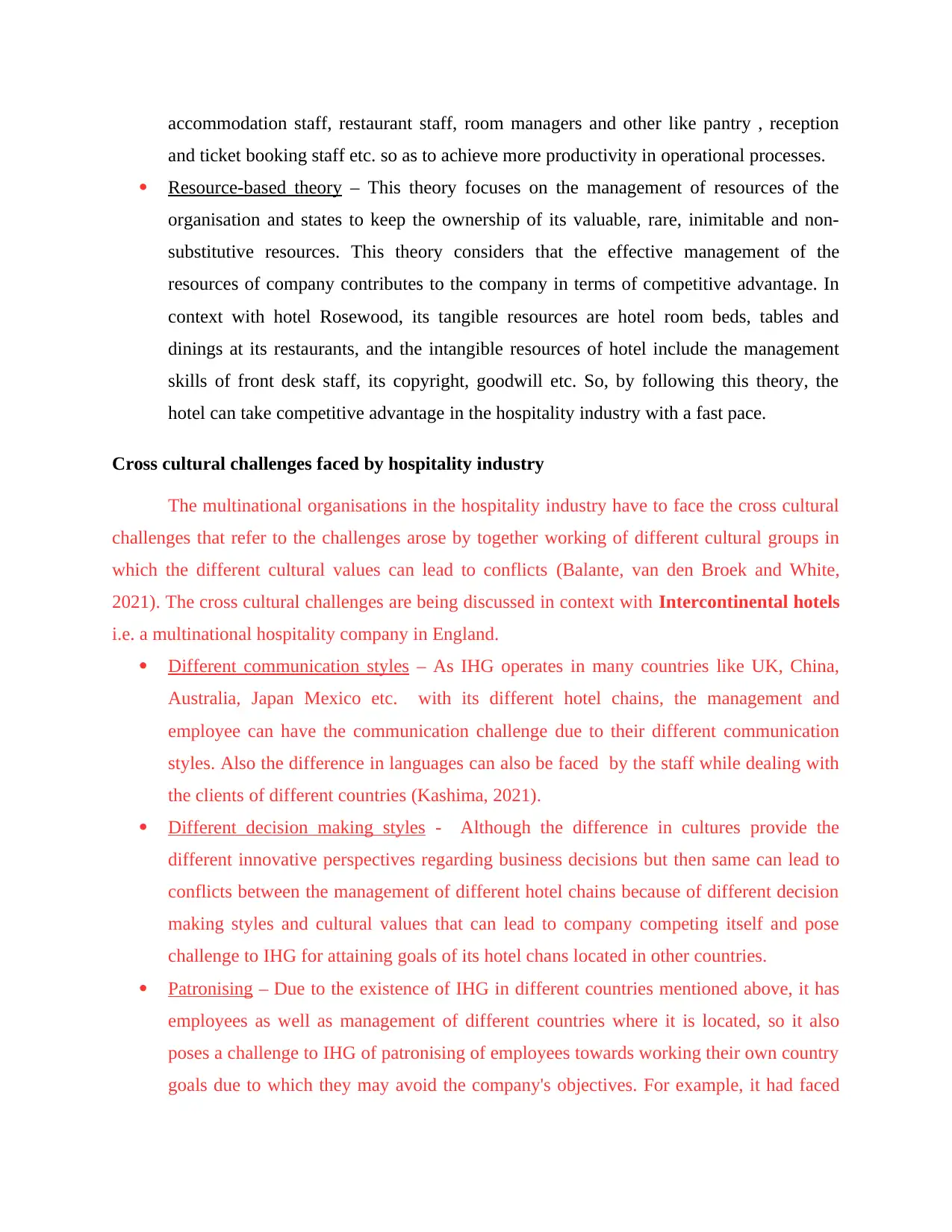
accommodation staff, restaurant staff, room managers and other like pantry , reception
and ticket booking staff etc. so as to achieve more productivity in operational processes.
Resource-based theory – This theory focuses on the management of resources of the
organisation and states to keep the ownership of its valuable, rare, inimitable and non-
substitutive resources. This theory considers that the effective management of the
resources of company contributes to the company in terms of competitive advantage. In
context with hotel Rosewood, its tangible resources are hotel room beds, tables and
dinings at its restaurants, and the intangible resources of hotel include the management
skills of front desk staff, its copyright, goodwill etc. So, by following this theory, the
hotel can take competitive advantage in the hospitality industry with a fast pace.
Cross cultural challenges faced by hospitality industry
The multinational organisations in the hospitality industry have to face the cross cultural
challenges that refer to the challenges arose by together working of different cultural groups in
which the different cultural values can lead to conflicts (Balante, van den Broek and White,
2021). The cross cultural challenges are being discussed in context with Intercontinental hotels
i.e. a multinational hospitality company in England.
Different communication styles – As IHG operates in many countries like UK, China,
Australia, Japan Mexico etc. with its different hotel chains, the management and
employee can have the communication challenge due to their different communication
styles. Also the difference in languages can also be faced by the staff while dealing with
the clients of different countries (Kashima, 2021).
Different decision making styles - Although the difference in cultures provide the
different innovative perspectives regarding business decisions but then same can lead to
conflicts between the management of different hotel chains because of different decision
making styles and cultural values that can lead to company competing itself and pose
challenge to IHG for attaining goals of its hotel chans located in other countries.
Patronising – Due to the existence of IHG in different countries mentioned above, it has
employees as well as management of different countries where it is located, so it also
poses a challenge to IHG of patronising of employees towards working their own country
goals due to which they may avoid the company's objectives. For example, it had faced
and ticket booking staff etc. so as to achieve more productivity in operational processes.
Resource-based theory – This theory focuses on the management of resources of the
organisation and states to keep the ownership of its valuable, rare, inimitable and non-
substitutive resources. This theory considers that the effective management of the
resources of company contributes to the company in terms of competitive advantage. In
context with hotel Rosewood, its tangible resources are hotel room beds, tables and
dinings at its restaurants, and the intangible resources of hotel include the management
skills of front desk staff, its copyright, goodwill etc. So, by following this theory, the
hotel can take competitive advantage in the hospitality industry with a fast pace.
Cross cultural challenges faced by hospitality industry
The multinational organisations in the hospitality industry have to face the cross cultural
challenges that refer to the challenges arose by together working of different cultural groups in
which the different cultural values can lead to conflicts (Balante, van den Broek and White,
2021). The cross cultural challenges are being discussed in context with Intercontinental hotels
i.e. a multinational hospitality company in England.
Different communication styles – As IHG operates in many countries like UK, China,
Australia, Japan Mexico etc. with its different hotel chains, the management and
employee can have the communication challenge due to their different communication
styles. Also the difference in languages can also be faced by the staff while dealing with
the clients of different countries (Kashima, 2021).
Different decision making styles - Although the difference in cultures provide the
different innovative perspectives regarding business decisions but then same can lead to
conflicts between the management of different hotel chains because of different decision
making styles and cultural values that can lead to company competing itself and pose
challenge to IHG for attaining goals of its hotel chans located in other countries.
Patronising – Due to the existence of IHG in different countries mentioned above, it has
employees as well as management of different countries where it is located, so it also
poses a challenge to IHG of patronising of employees towards working their own country
goals due to which they may avoid the company's objectives. For example, it had faced
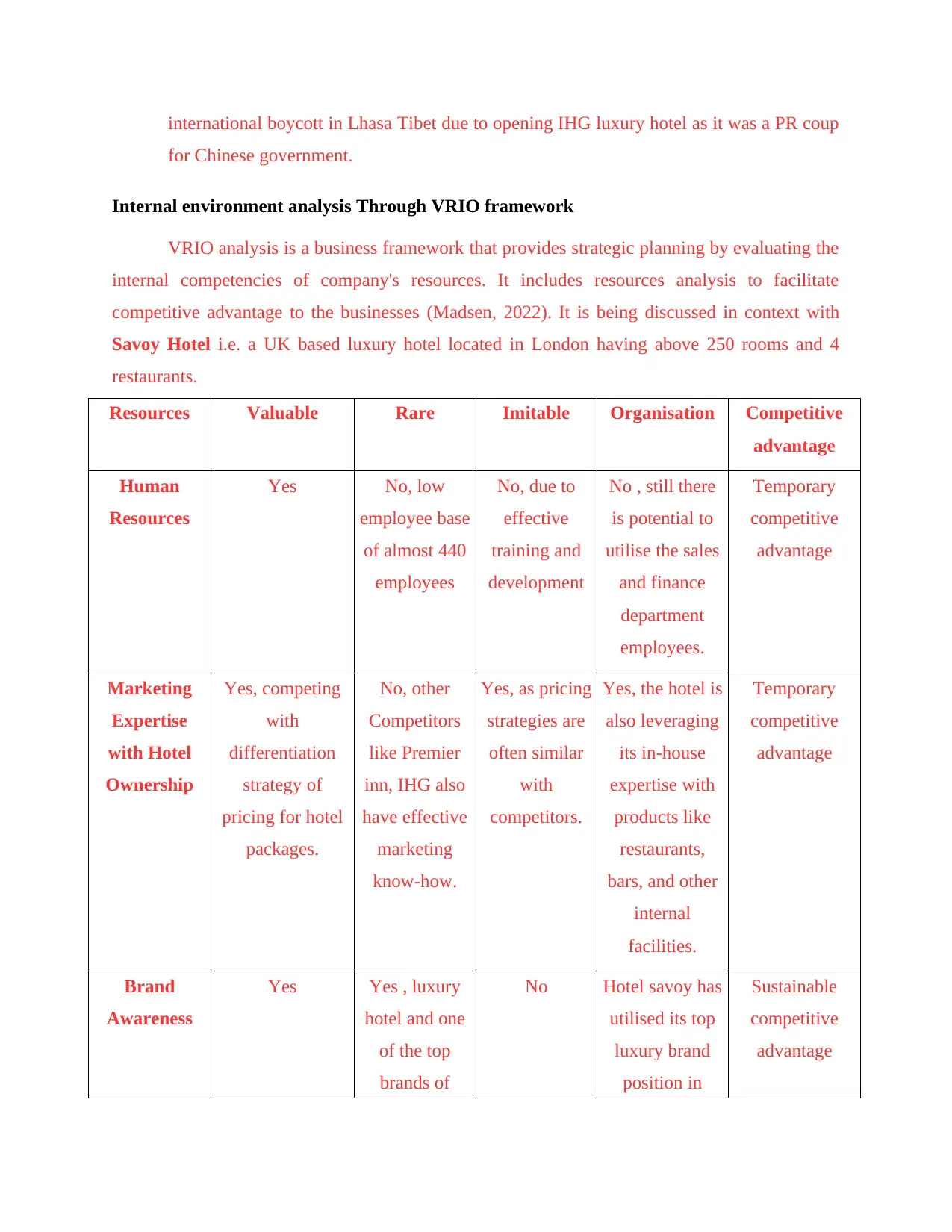
international boycott in Lhasa Tibet due to opening IHG luxury hotel as it was a PR coup
for Chinese government.
Internal environment analysis Through VRIO framework
VRIO analysis is a business framework that provides strategic planning by evaluating the
internal competencies of company's resources. It includes resources analysis to facilitate
competitive advantage to the businesses (Madsen, 2022). It is being discussed in context with
Savoy Hotel i.e. a UK based luxury hotel located in London having above 250 rooms and 4
restaurants.
Resources Valuable Rare Imitable Organisation Competitive
advantage
Human
Resources
Yes No, low
employee base
of almost 440
employees
No, due to
effective
training and
development
No , still there
is potential to
utilise the sales
and finance
department
employees.
Temporary
competitive
advantage
Marketing
Expertise
with Hotel
Ownership
Yes, competing
with
differentiation
strategy of
pricing for hotel
packages.
No, other
Competitors
like Premier
inn, IHG also
have effective
marketing
know-how.
Yes, as pricing
strategies are
often similar
with
competitors.
Yes, the hotel is
also leveraging
its in-house
expertise with
products like
restaurants,
bars, and other
internal
facilities.
Temporary
competitive
advantage
Brand
Awareness
Yes Yes , luxury
hotel and one
of the top
brands of
No Hotel savoy has
utilised its top
luxury brand
position in
Sustainable
competitive
advantage
for Chinese government.
Internal environment analysis Through VRIO framework
VRIO analysis is a business framework that provides strategic planning by evaluating the
internal competencies of company's resources. It includes resources analysis to facilitate
competitive advantage to the businesses (Madsen, 2022). It is being discussed in context with
Savoy Hotel i.e. a UK based luxury hotel located in London having above 250 rooms and 4
restaurants.
Resources Valuable Rare Imitable Organisation Competitive
advantage
Human
Resources
Yes No, low
employee base
of almost 440
employees
No, due to
effective
training and
development
No , still there
is potential to
utilise the sales
and finance
department
employees.
Temporary
competitive
advantage
Marketing
Expertise
with Hotel
Ownership
Yes, competing
with
differentiation
strategy of
pricing for hotel
packages.
No, other
Competitors
like Premier
inn, IHG also
have effective
marketing
know-how.
Yes, as pricing
strategies are
often similar
with
competitors.
Yes, the hotel is
also leveraging
its in-house
expertise with
products like
restaurants,
bars, and other
internal
facilities.
Temporary
competitive
advantage
Brand
Awareness
Yes Yes , luxury
hotel and one
of the top
brands of
No Hotel savoy has
utilised its top
luxury brand
position in
Sustainable
competitive
advantage
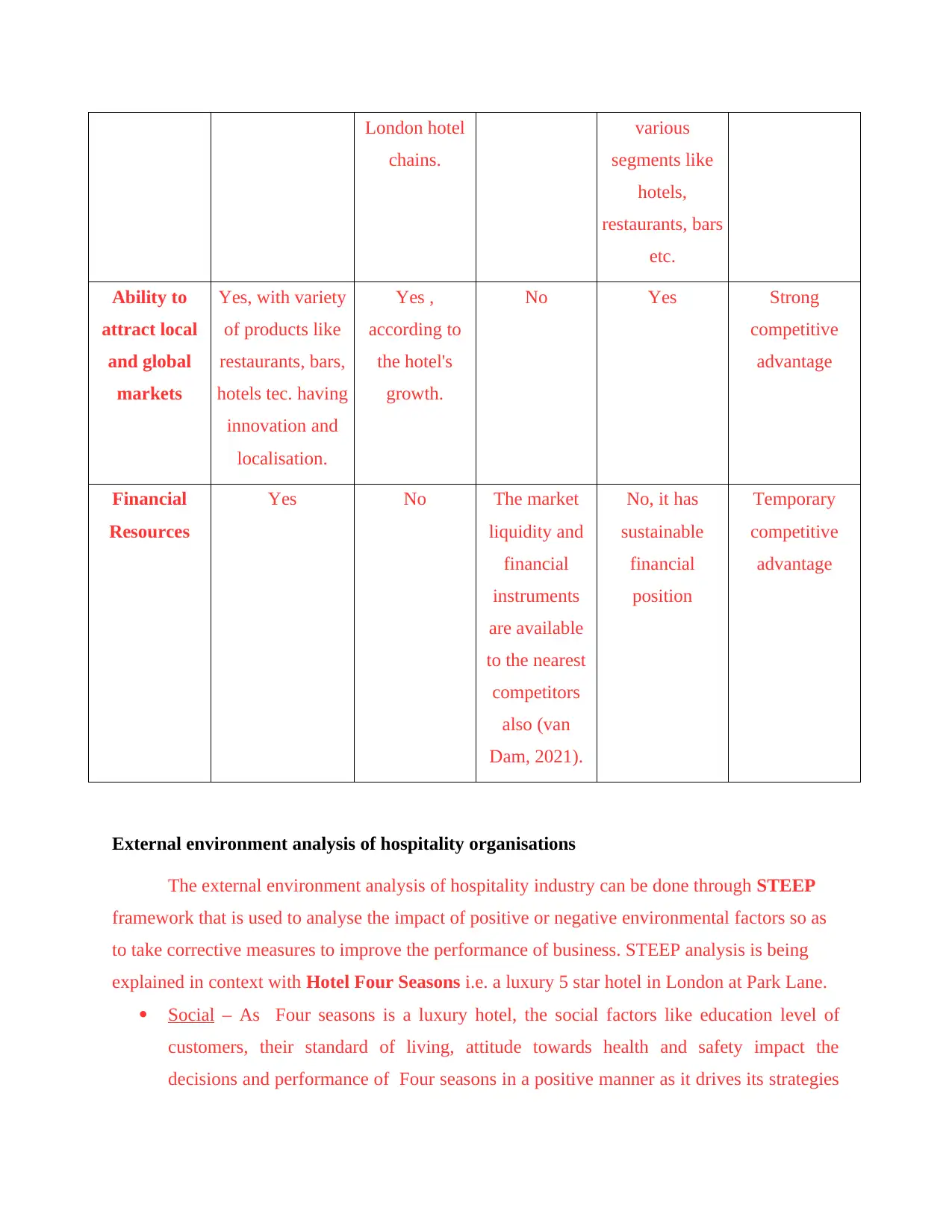
London hotel
chains.
various
segments like
hotels,
restaurants, bars
etc.
Ability to
attract local
and global
markets
Yes, with variety
of products like
restaurants, bars,
hotels tec. having
innovation and
localisation.
Yes ,
according to
the hotel's
growth.
No Yes Strong
competitive
advantage
Financial
Resources
Yes No The market
liquidity and
financial
instruments
are available
to the nearest
competitors
also (van
Dam, 2021).
No, it has
sustainable
financial
position
Temporary
competitive
advantage
External environment analysis of hospitality organisations
The external environment analysis of hospitality industry can be done through STEEP
framework that is used to analyse the impact of positive or negative environmental factors so as
to take corrective measures to improve the performance of business. STEEP analysis is being
explained in context with Hotel Four Seasons i.e. a luxury 5 star hotel in London at Park Lane.
Social – As Four seasons is a luxury hotel, the social factors like education level of
customers, their standard of living, attitude towards health and safety impact the
decisions and performance of Four seasons in a positive manner as it drives its strategies
chains.
various
segments like
hotels,
restaurants, bars
etc.
Ability to
attract local
and global
markets
Yes, with variety
of products like
restaurants, bars,
hotels tec. having
innovation and
localisation.
Yes ,
according to
the hotel's
growth.
No Yes Strong
competitive
advantage
Financial
Resources
Yes No The market
liquidity and
financial
instruments
are available
to the nearest
competitors
also (van
Dam, 2021).
No, it has
sustainable
financial
position
Temporary
competitive
advantage
External environment analysis of hospitality organisations
The external environment analysis of hospitality industry can be done through STEEP
framework that is used to analyse the impact of positive or negative environmental factors so as
to take corrective measures to improve the performance of business. STEEP analysis is being
explained in context with Hotel Four Seasons i.e. a luxury 5 star hotel in London at Park Lane.
Social – As Four seasons is a luxury hotel, the social factors like education level of
customers, their standard of living, attitude towards health and safety impact the
decisions and performance of Four seasons in a positive manner as it drives its strategies
Paraphrase This Document
Need a fresh take? Get an instant paraphrase of this document with our AI Paraphraser
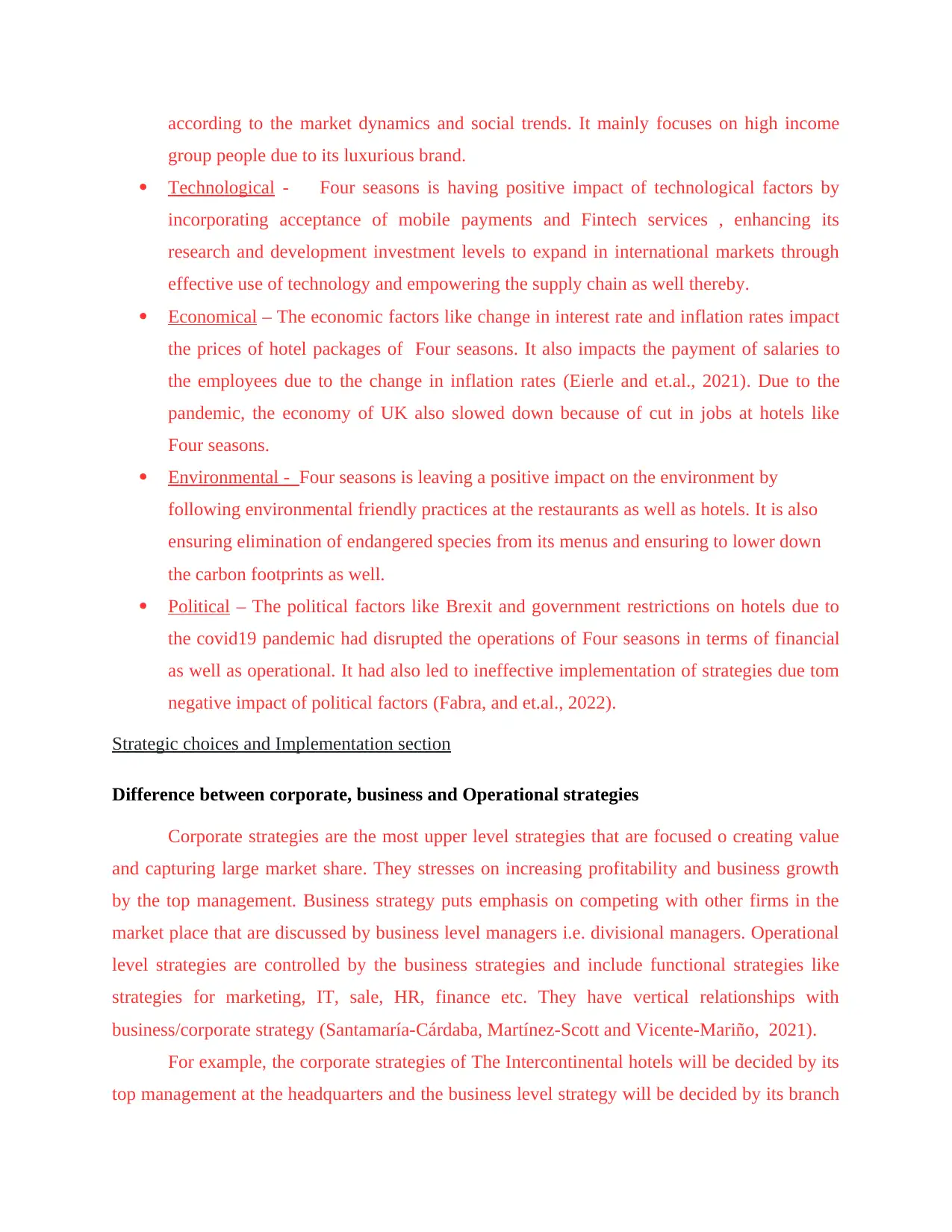
according to the market dynamics and social trends. It mainly focuses on high income
group people due to its luxurious brand.
Technological - Four seasons is having positive impact of technological factors by
incorporating acceptance of mobile payments and Fintech services , enhancing its
research and development investment levels to expand in international markets through
effective use of technology and empowering the supply chain as well thereby.
Economical – The economic factors like change in interest rate and inflation rates impact
the prices of hotel packages of Four seasons. It also impacts the payment of salaries to
the employees due to the change in inflation rates (Eierle and et.al., 2021). Due to the
pandemic, the economy of UK also slowed down because of cut in jobs at hotels like
Four seasons.
Environmental - Four seasons is leaving a positive impact on the environment by
following environmental friendly practices at the restaurants as well as hotels. It is also
ensuring elimination of endangered species from its menus and ensuring to lower down
the carbon footprints as well.
Political – The political factors like Brexit and government restrictions on hotels due to
the covid19 pandemic had disrupted the operations of Four seasons in terms of financial
as well as operational. It had also led to ineffective implementation of strategies due tom
negative impact of political factors (Fabra, and et.al., 2022).
Strategic choices and Implementation section
Difference between corporate, business and Operational strategies
Corporate strategies are the most upper level strategies that are focused o creating value
and capturing large market share. They stresses on increasing profitability and business growth
by the top management. Business strategy puts emphasis on competing with other firms in the
market place that are discussed by business level managers i.e. divisional managers. Operational
level strategies are controlled by the business strategies and include functional strategies like
strategies for marketing, IT, sale, HR, finance etc. They have vertical relationships with
business/corporate strategy (Santamaría-Cárdaba, Martínez-Scott and Vicente-Mariño, 2021).
For example, the corporate strategies of The Intercontinental hotels will be decided by its
top management at the headquarters and the business level strategy will be decided by its branch
group people due to its luxurious brand.
Technological - Four seasons is having positive impact of technological factors by
incorporating acceptance of mobile payments and Fintech services , enhancing its
research and development investment levels to expand in international markets through
effective use of technology and empowering the supply chain as well thereby.
Economical – The economic factors like change in interest rate and inflation rates impact
the prices of hotel packages of Four seasons. It also impacts the payment of salaries to
the employees due to the change in inflation rates (Eierle and et.al., 2021). Due to the
pandemic, the economy of UK also slowed down because of cut in jobs at hotels like
Four seasons.
Environmental - Four seasons is leaving a positive impact on the environment by
following environmental friendly practices at the restaurants as well as hotels. It is also
ensuring elimination of endangered species from its menus and ensuring to lower down
the carbon footprints as well.
Political – The political factors like Brexit and government restrictions on hotels due to
the covid19 pandemic had disrupted the operations of Four seasons in terms of financial
as well as operational. It had also led to ineffective implementation of strategies due tom
negative impact of political factors (Fabra, and et.al., 2022).
Strategic choices and Implementation section
Difference between corporate, business and Operational strategies
Corporate strategies are the most upper level strategies that are focused o creating value
and capturing large market share. They stresses on increasing profitability and business growth
by the top management. Business strategy puts emphasis on competing with other firms in the
market place that are discussed by business level managers i.e. divisional managers. Operational
level strategies are controlled by the business strategies and include functional strategies like
strategies for marketing, IT, sale, HR, finance etc. They have vertical relationships with
business/corporate strategy (Santamaría-Cárdaba, Martínez-Scott and Vicente-Mariño, 2021).
For example, the corporate strategies of The Intercontinental hotels will be decided by its
top management at the headquarters and the business level strategy will be decided by its branch
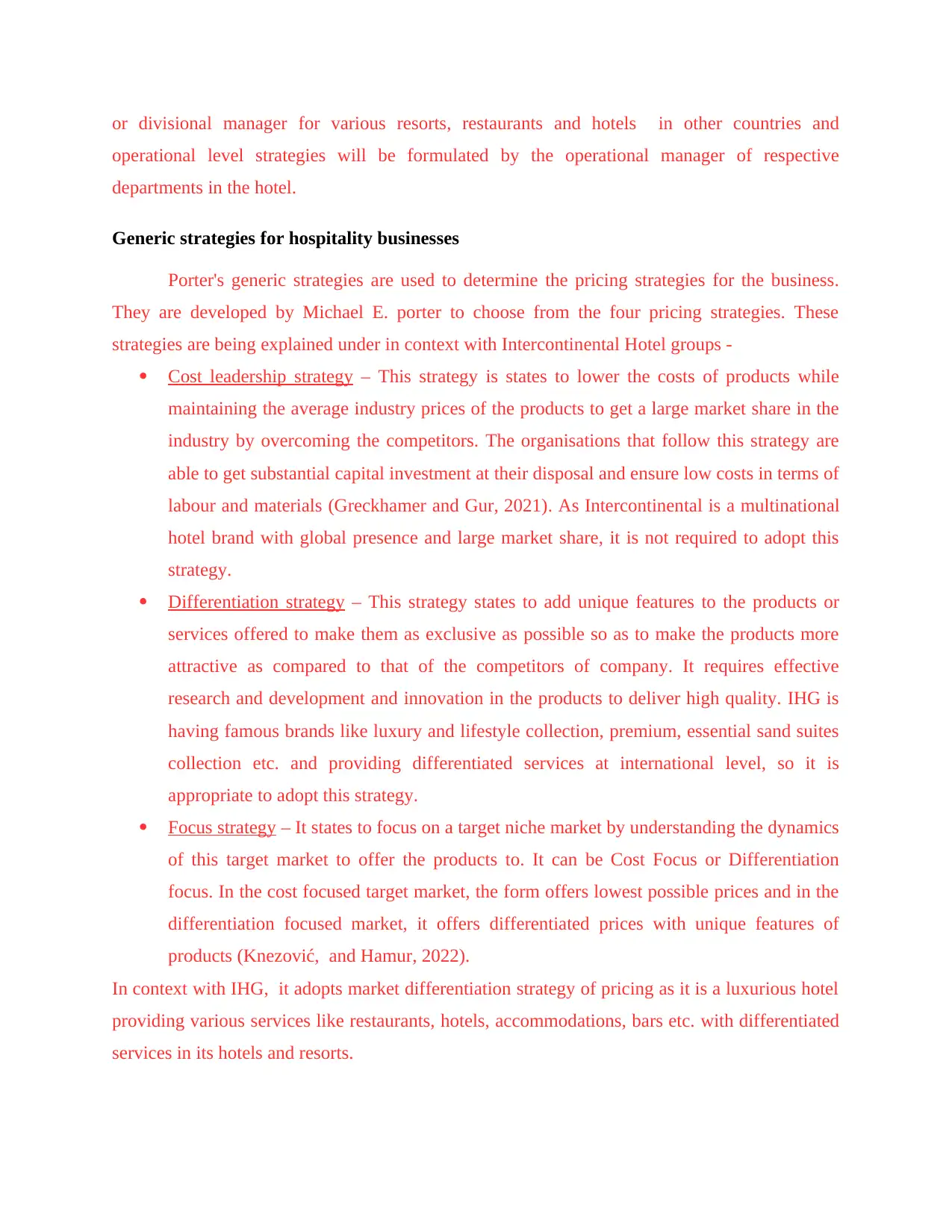
or divisional manager for various resorts, restaurants and hotels in other countries and
operational level strategies will be formulated by the operational manager of respective
departments in the hotel.
Generic strategies for hospitality businesses
Porter's generic strategies are used to determine the pricing strategies for the business.
They are developed by Michael E. porter to choose from the four pricing strategies. These
strategies are being explained under in context with Intercontinental Hotel groups -
Cost leadership strategy – This strategy is states to lower the costs of products while
maintaining the average industry prices of the products to get a large market share in the
industry by overcoming the competitors. The organisations that follow this strategy are
able to get substantial capital investment at their disposal and ensure low costs in terms of
labour and materials (Greckhamer and Gur, 2021). As Intercontinental is a multinational
hotel brand with global presence and large market share, it is not required to adopt this
strategy.
Differentiation strategy – This strategy states to add unique features to the products or
services offered to make them as exclusive as possible so as to make the products more
attractive as compared to that of the competitors of company. It requires effective
research and development and innovation in the products to deliver high quality. IHG is
having famous brands like luxury and lifestyle collection, premium, essential sand suites
collection etc. and providing differentiated services at international level, so it is
appropriate to adopt this strategy.
Focus strategy – It states to focus on a target niche market by understanding the dynamics
of this target market to offer the products to. It can be Cost Focus or Differentiation
focus. In the cost focused target market, the form offers lowest possible prices and in the
differentiation focused market, it offers differentiated prices with unique features of
products (Knezović, and Hamur, 2022).
In context with IHG, it adopts market differentiation strategy of pricing as it is a luxurious hotel
providing various services like restaurants, hotels, accommodations, bars etc. with differentiated
services in its hotels and resorts.
operational level strategies will be formulated by the operational manager of respective
departments in the hotel.
Generic strategies for hospitality businesses
Porter's generic strategies are used to determine the pricing strategies for the business.
They are developed by Michael E. porter to choose from the four pricing strategies. These
strategies are being explained under in context with Intercontinental Hotel groups -
Cost leadership strategy – This strategy is states to lower the costs of products while
maintaining the average industry prices of the products to get a large market share in the
industry by overcoming the competitors. The organisations that follow this strategy are
able to get substantial capital investment at their disposal and ensure low costs in terms of
labour and materials (Greckhamer and Gur, 2021). As Intercontinental is a multinational
hotel brand with global presence and large market share, it is not required to adopt this
strategy.
Differentiation strategy – This strategy states to add unique features to the products or
services offered to make them as exclusive as possible so as to make the products more
attractive as compared to that of the competitors of company. It requires effective
research and development and innovation in the products to deliver high quality. IHG is
having famous brands like luxury and lifestyle collection, premium, essential sand suites
collection etc. and providing differentiated services at international level, so it is
appropriate to adopt this strategy.
Focus strategy – It states to focus on a target niche market by understanding the dynamics
of this target market to offer the products to. It can be Cost Focus or Differentiation
focus. In the cost focused target market, the form offers lowest possible prices and in the
differentiation focused market, it offers differentiated prices with unique features of
products (Knezović, and Hamur, 2022).
In context with IHG, it adopts market differentiation strategy of pricing as it is a luxurious hotel
providing various services like restaurants, hotels, accommodations, bars etc. with differentiated
services in its hotels and resorts.
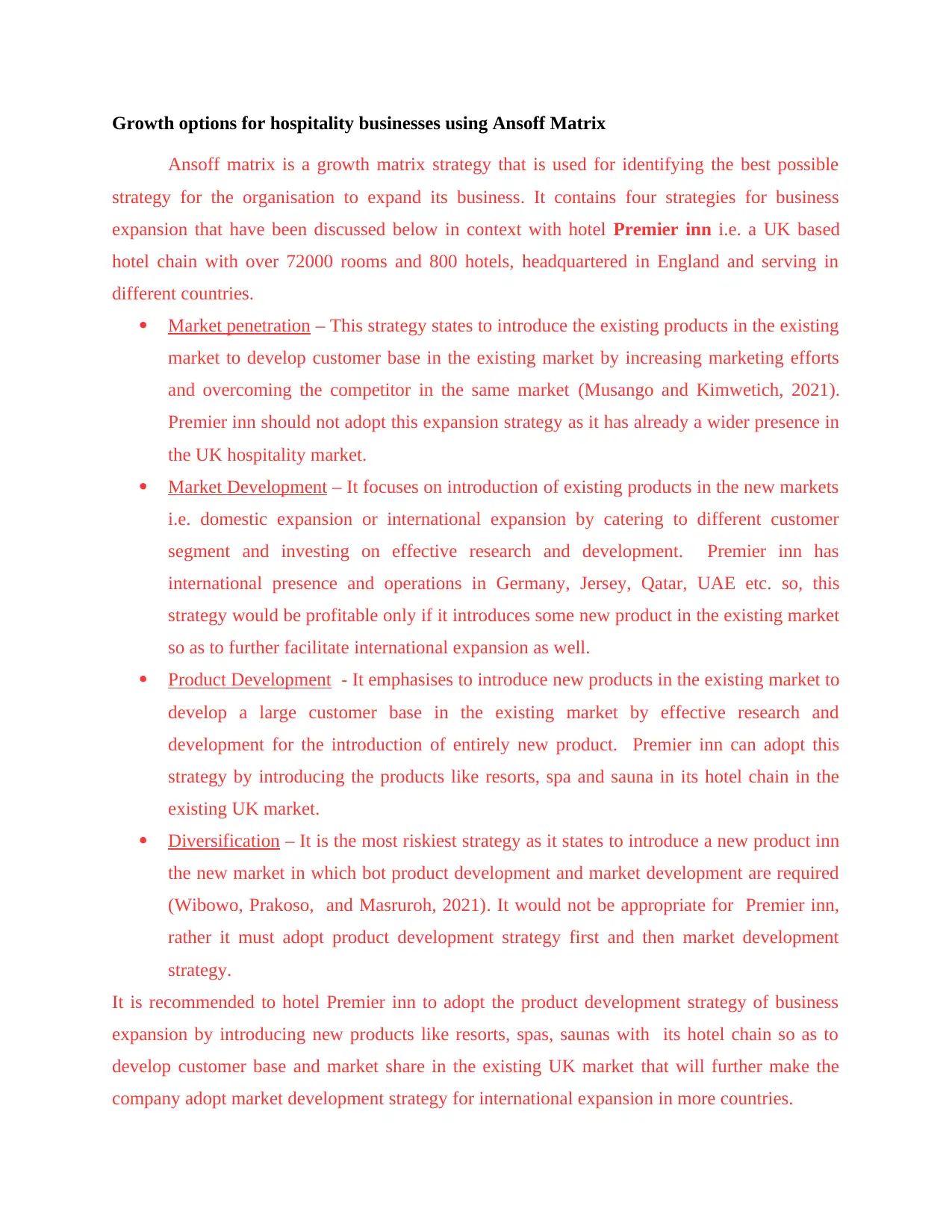
Growth options for hospitality businesses using Ansoff Matrix
Ansoff matrix is a growth matrix strategy that is used for identifying the best possible
strategy for the organisation to expand its business. It contains four strategies for business
expansion that have been discussed below in context with hotel Premier inn i.e. a UK based
hotel chain with over 72000 rooms and 800 hotels, headquartered in England and serving in
different countries.
Market penetration – This strategy states to introduce the existing products in the existing
market to develop customer base in the existing market by increasing marketing efforts
and overcoming the competitor in the same market (Musango and Kimwetich, 2021).
Premier inn should not adopt this expansion strategy as it has already a wider presence in
the UK hospitality market.
Market Development – It focuses on introduction of existing products in the new markets
i.e. domestic expansion or international expansion by catering to different customer
segment and investing on effective research and development. Premier inn has
international presence and operations in Germany, Jersey, Qatar, UAE etc. so, this
strategy would be profitable only if it introduces some new product in the existing market
so as to further facilitate international expansion as well.
Product Development - It emphasises to introduce new products in the existing market to
develop a large customer base in the existing market by effective research and
development for the introduction of entirely new product. Premier inn can adopt this
strategy by introducing the products like resorts, spa and sauna in its hotel chain in the
existing UK market.
Diversification – It is the most riskiest strategy as it states to introduce a new product inn
the new market in which bot product development and market development are required
(Wibowo, Prakoso, and Masruroh, 2021). It would not be appropriate for Premier inn,
rather it must adopt product development strategy first and then market development
strategy.
It is recommended to hotel Premier inn to adopt the product development strategy of business
expansion by introducing new products like resorts, spas, saunas with its hotel chain so as to
develop customer base and market share in the existing UK market that will further make the
company adopt market development strategy for international expansion in more countries.
Ansoff matrix is a growth matrix strategy that is used for identifying the best possible
strategy for the organisation to expand its business. It contains four strategies for business
expansion that have been discussed below in context with hotel Premier inn i.e. a UK based
hotel chain with over 72000 rooms and 800 hotels, headquartered in England and serving in
different countries.
Market penetration – This strategy states to introduce the existing products in the existing
market to develop customer base in the existing market by increasing marketing efforts
and overcoming the competitor in the same market (Musango and Kimwetich, 2021).
Premier inn should not adopt this expansion strategy as it has already a wider presence in
the UK hospitality market.
Market Development – It focuses on introduction of existing products in the new markets
i.e. domestic expansion or international expansion by catering to different customer
segment and investing on effective research and development. Premier inn has
international presence and operations in Germany, Jersey, Qatar, UAE etc. so, this
strategy would be profitable only if it introduces some new product in the existing market
so as to further facilitate international expansion as well.
Product Development - It emphasises to introduce new products in the existing market to
develop a large customer base in the existing market by effective research and
development for the introduction of entirely new product. Premier inn can adopt this
strategy by introducing the products like resorts, spa and sauna in its hotel chain in the
existing UK market.
Diversification – It is the most riskiest strategy as it states to introduce a new product inn
the new market in which bot product development and market development are required
(Wibowo, Prakoso, and Masruroh, 2021). It would not be appropriate for Premier inn,
rather it must adopt product development strategy first and then market development
strategy.
It is recommended to hotel Premier inn to adopt the product development strategy of business
expansion by introducing new products like resorts, spas, saunas with its hotel chain so as to
develop customer base and market share in the existing UK market that will further make the
company adopt market development strategy for international expansion in more countries.
Secure Best Marks with AI Grader
Need help grading? Try our AI Grader for instant feedback on your assignments.
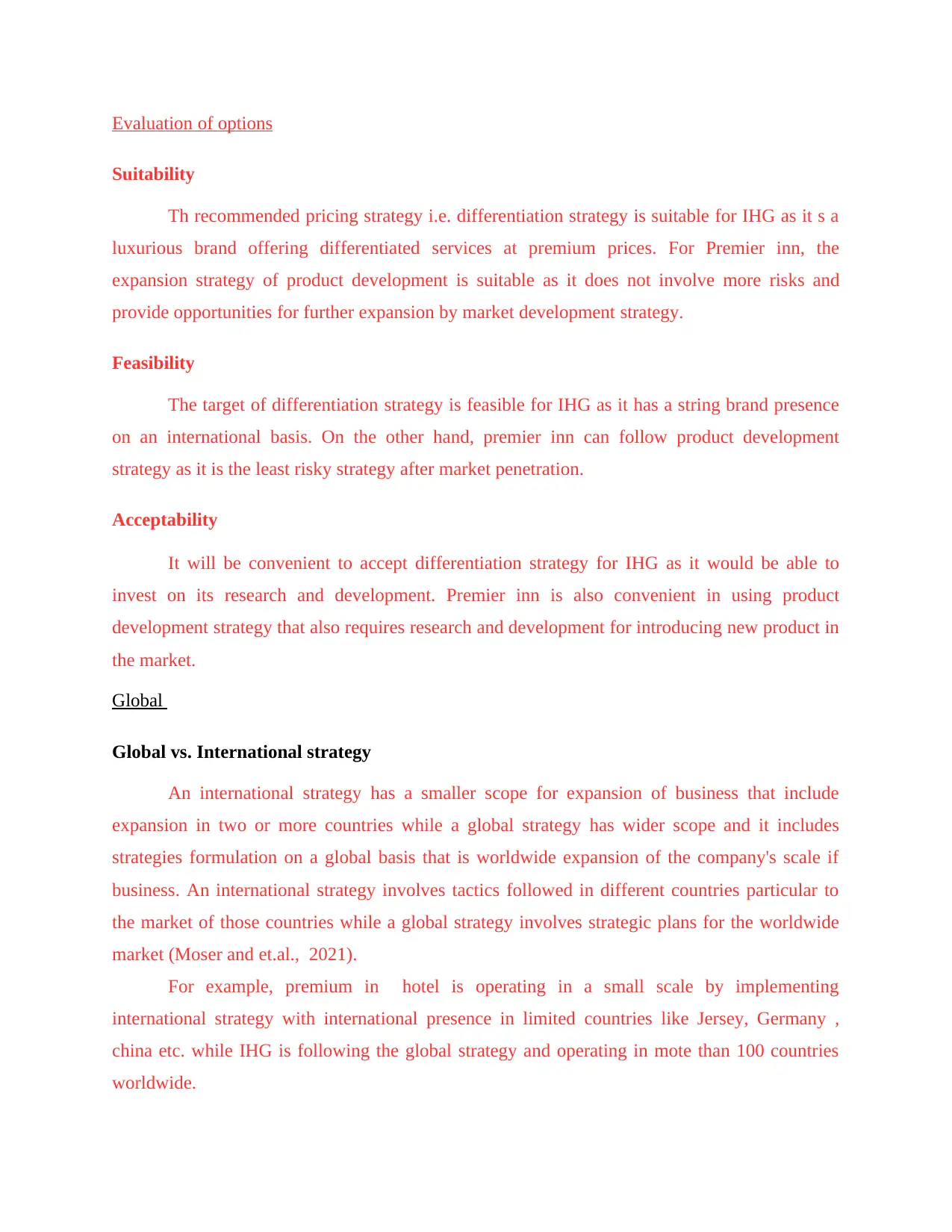
Evaluation of options
Suitability
Th recommended pricing strategy i.e. differentiation strategy is suitable for IHG as it s a
luxurious brand offering differentiated services at premium prices. For Premier inn, the
expansion strategy of product development is suitable as it does not involve more risks and
provide opportunities for further expansion by market development strategy.
Feasibility
The target of differentiation strategy is feasible for IHG as it has a string brand presence
on an international basis. On the other hand, premier inn can follow product development
strategy as it is the least risky strategy after market penetration.
Acceptability
It will be convenient to accept differentiation strategy for IHG as it would be able to
invest on its research and development. Premier inn is also convenient in using product
development strategy that also requires research and development for introducing new product in
the market.
Global
Global vs. International strategy
An international strategy has a smaller scope for expansion of business that include
expansion in two or more countries while a global strategy has wider scope and it includes
strategies formulation on a global basis that is worldwide expansion of the company's scale if
business. An international strategy involves tactics followed in different countries particular to
the market of those countries while a global strategy involves strategic plans for the worldwide
market (Moser and et.al., 2021).
For example, premium in hotel is operating in a small scale by implementing
international strategy with international presence in limited countries like Jersey, Germany ,
china etc. while IHG is following the global strategy and operating in mote than 100 countries
worldwide.
Suitability
Th recommended pricing strategy i.e. differentiation strategy is suitable for IHG as it s a
luxurious brand offering differentiated services at premium prices. For Premier inn, the
expansion strategy of product development is suitable as it does not involve more risks and
provide opportunities for further expansion by market development strategy.
Feasibility
The target of differentiation strategy is feasible for IHG as it has a string brand presence
on an international basis. On the other hand, premier inn can follow product development
strategy as it is the least risky strategy after market penetration.
Acceptability
It will be convenient to accept differentiation strategy for IHG as it would be able to
invest on its research and development. Premier inn is also convenient in using product
development strategy that also requires research and development for introducing new product in
the market.
Global
Global vs. International strategy
An international strategy has a smaller scope for expansion of business that include
expansion in two or more countries while a global strategy has wider scope and it includes
strategies formulation on a global basis that is worldwide expansion of the company's scale if
business. An international strategy involves tactics followed in different countries particular to
the market of those countries while a global strategy involves strategic plans for the worldwide
market (Moser and et.al., 2021).
For example, premium in hotel is operating in a small scale by implementing
international strategy with international presence in limited countries like Jersey, Germany ,
china etc. while IHG is following the global strategy and operating in mote than 100 countries
worldwide.
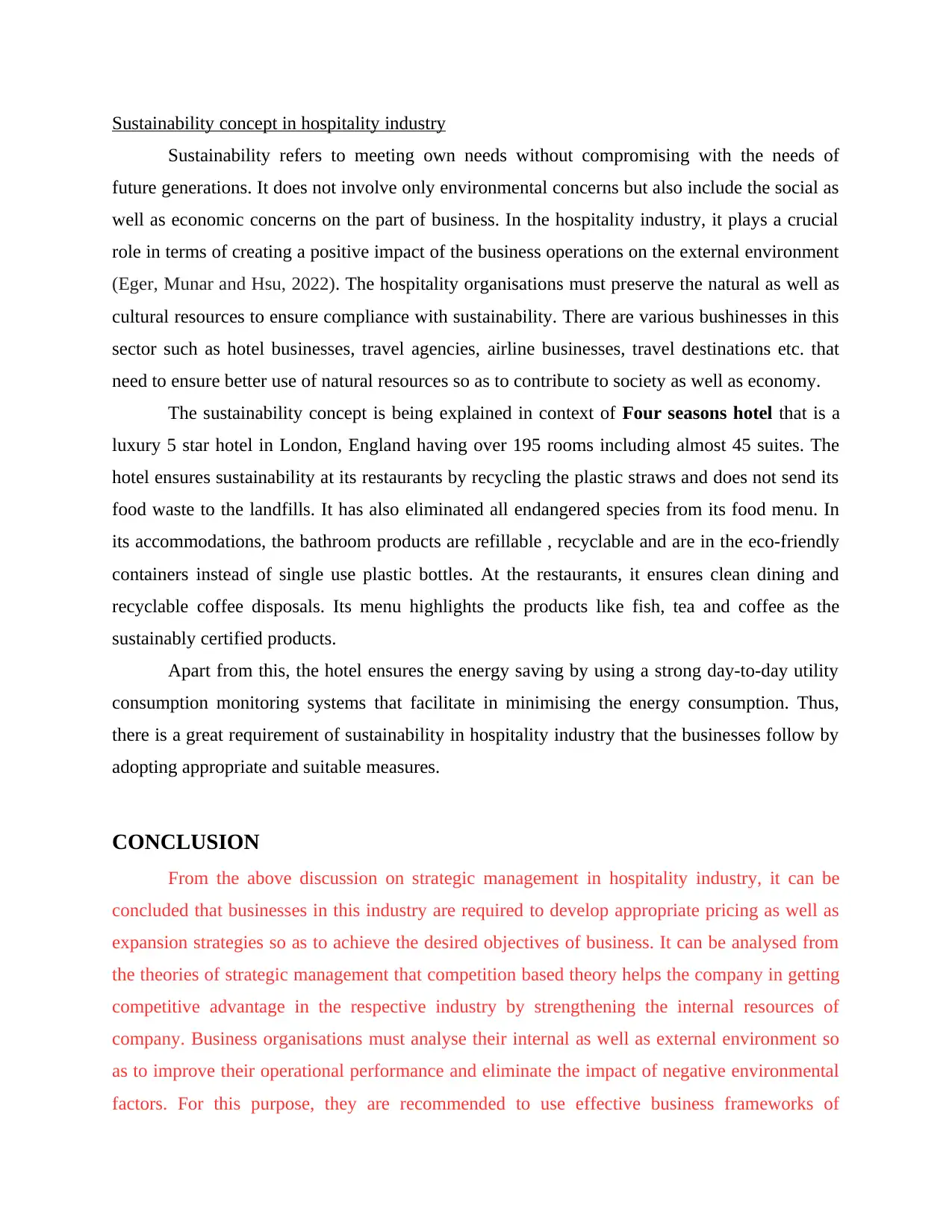
Sustainability concept in hospitality industry
Sustainability refers to meeting own needs without compromising with the needs of
future generations. It does not involve only environmental concerns but also include the social as
well as economic concerns on the part of business. In the hospitality industry, it plays a crucial
role in terms of creating a positive impact of the business operations on the external environment
(Eger, Munar and Hsu, 2022). The hospitality organisations must preserve the natural as well as
cultural resources to ensure compliance with sustainability. There are various bushinesses in this
sector such as hotel businesses, travel agencies, airline businesses, travel destinations etc. that
need to ensure better use of natural resources so as to contribute to society as well as economy.
The sustainability concept is being explained in context of Four seasons hotel that is a
luxury 5 star hotel in London, England having over 195 rooms including almost 45 suites. The
hotel ensures sustainability at its restaurants by recycling the plastic straws and does not send its
food waste to the landfills. It has also eliminated all endangered species from its food menu. In
its accommodations, the bathroom products are refillable , recyclable and are in the eco-friendly
containers instead of single use plastic bottles. At the restaurants, it ensures clean dining and
recyclable coffee disposals. Its menu highlights the products like fish, tea and coffee as the
sustainably certified products.
Apart from this, the hotel ensures the energy saving by using a strong day-to-day utility
consumption monitoring systems that facilitate in minimising the energy consumption. Thus,
there is a great requirement of sustainability in hospitality industry that the businesses follow by
adopting appropriate and suitable measures.
CONCLUSION
From the above discussion on strategic management in hospitality industry, it can be
concluded that businesses in this industry are required to develop appropriate pricing as well as
expansion strategies so as to achieve the desired objectives of business. It can be analysed from
the theories of strategic management that competition based theory helps the company in getting
competitive advantage in the respective industry by strengthening the internal resources of
company. Business organisations must analyse their internal as well as external environment so
as to improve their operational performance and eliminate the impact of negative environmental
factors. For this purpose, they are recommended to use effective business frameworks of
Sustainability refers to meeting own needs without compromising with the needs of
future generations. It does not involve only environmental concerns but also include the social as
well as economic concerns on the part of business. In the hospitality industry, it plays a crucial
role in terms of creating a positive impact of the business operations on the external environment
(Eger, Munar and Hsu, 2022). The hospitality organisations must preserve the natural as well as
cultural resources to ensure compliance with sustainability. There are various bushinesses in this
sector such as hotel businesses, travel agencies, airline businesses, travel destinations etc. that
need to ensure better use of natural resources so as to contribute to society as well as economy.
The sustainability concept is being explained in context of Four seasons hotel that is a
luxury 5 star hotel in London, England having over 195 rooms including almost 45 suites. The
hotel ensures sustainability at its restaurants by recycling the plastic straws and does not send its
food waste to the landfills. It has also eliminated all endangered species from its food menu. In
its accommodations, the bathroom products are refillable , recyclable and are in the eco-friendly
containers instead of single use plastic bottles. At the restaurants, it ensures clean dining and
recyclable coffee disposals. Its menu highlights the products like fish, tea and coffee as the
sustainably certified products.
Apart from this, the hotel ensures the energy saving by using a strong day-to-day utility
consumption monitoring systems that facilitate in minimising the energy consumption. Thus,
there is a great requirement of sustainability in hospitality industry that the businesses follow by
adopting appropriate and suitable measures.
CONCLUSION
From the above discussion on strategic management in hospitality industry, it can be
concluded that businesses in this industry are required to develop appropriate pricing as well as
expansion strategies so as to achieve the desired objectives of business. It can be analysed from
the theories of strategic management that competition based theory helps the company in getting
competitive advantage in the respective industry by strengthening the internal resources of
company. Business organisations must analyse their internal as well as external environment so
as to improve their operational performance and eliminate the impact of negative environmental
factors. For this purpose, they are recommended to use effective business frameworks of
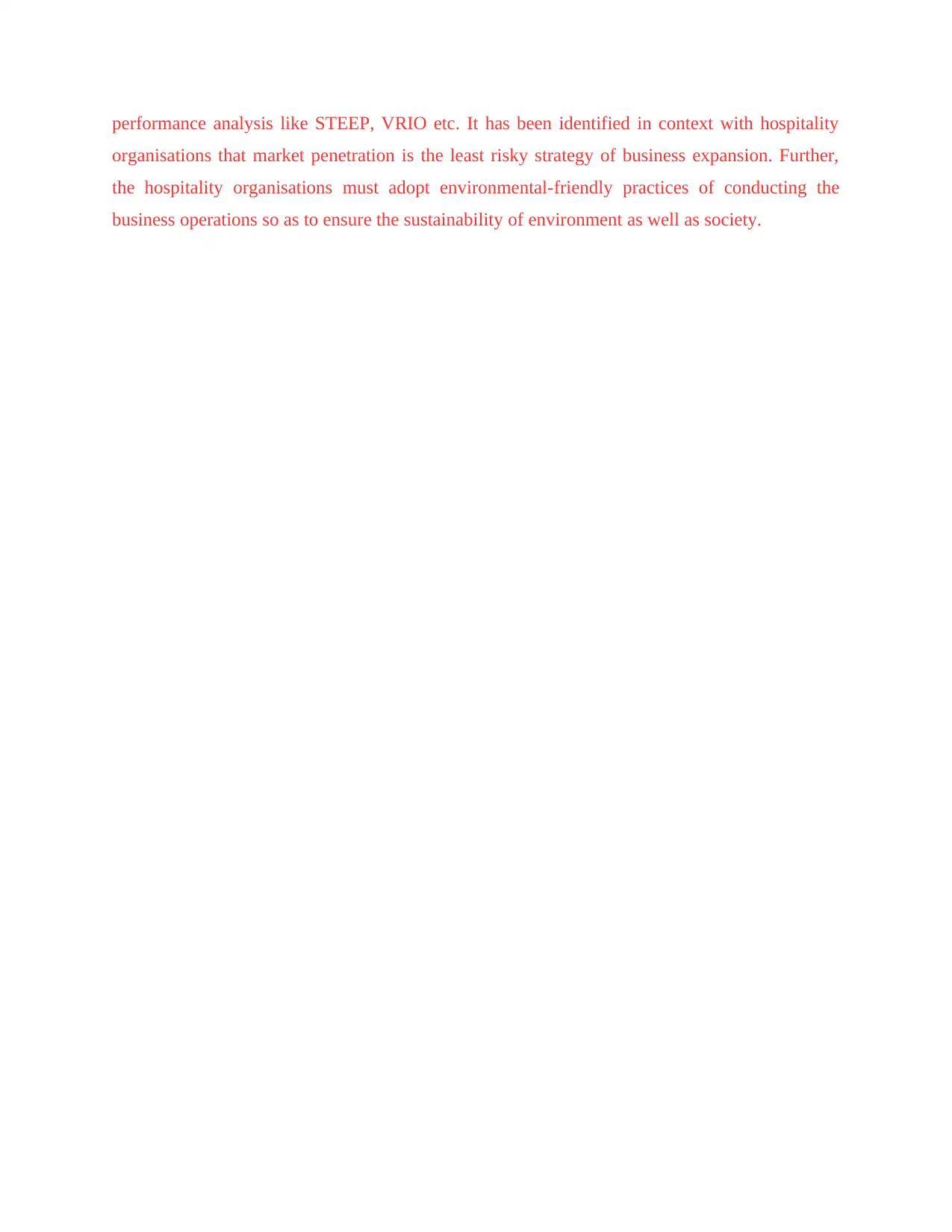
performance analysis like STEEP, VRIO etc. It has been identified in context with hospitality
organisations that market penetration is the least risky strategy of business expansion. Further,
the hospitality organisations must adopt environmental-friendly practices of conducting the
business operations so as to ensure the sustainability of environment as well as society.
organisations that market penetration is the least risky strategy of business expansion. Further,
the hospitality organisations must adopt environmental-friendly practices of conducting the
business operations so as to ensure the sustainability of environment as well as society.
Paraphrase This Document
Need a fresh take? Get an instant paraphrase of this document with our AI Paraphraser
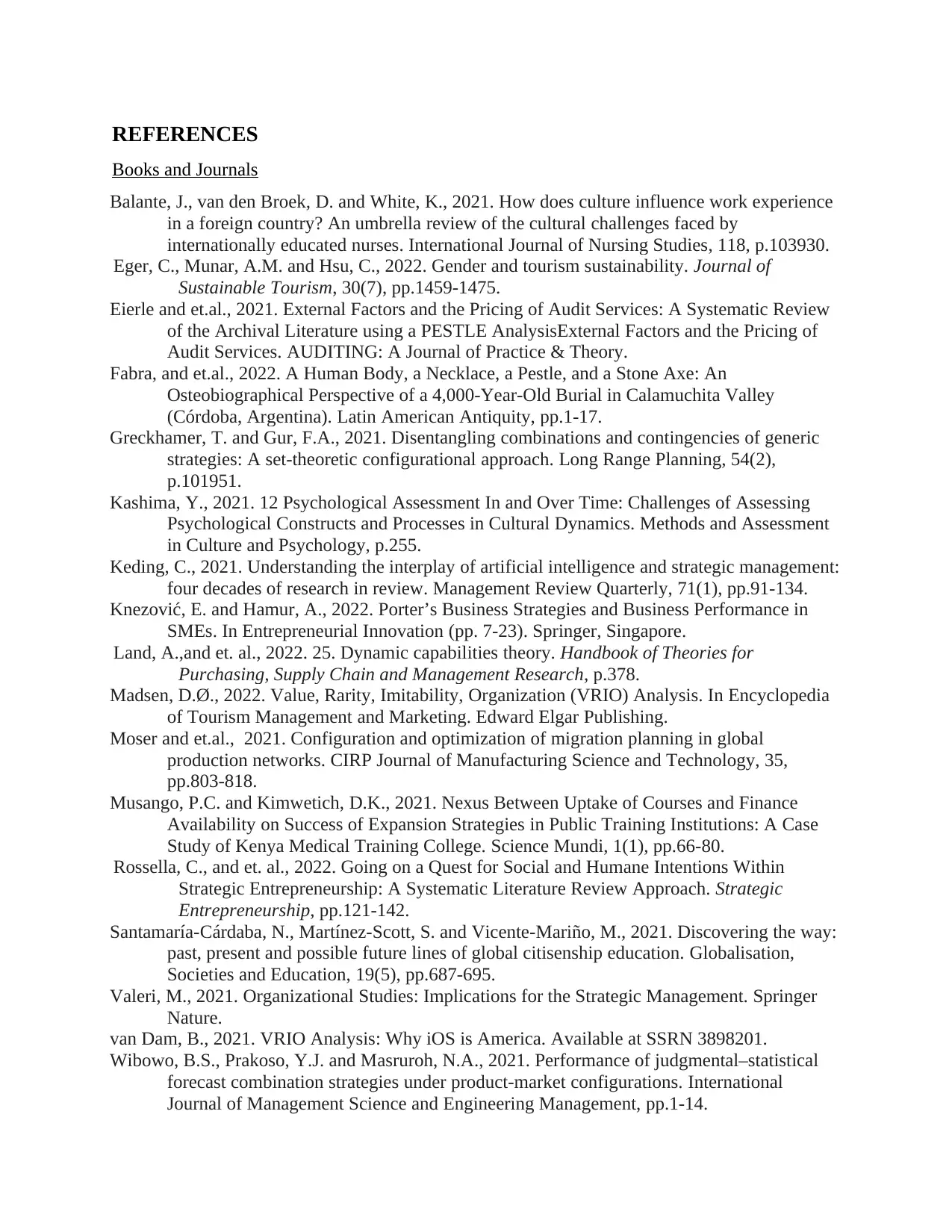
REFERENCES
Books and Journals
Balante, J., van den Broek, D. and White, K., 2021. How does culture influence work experience
in a foreign country? An umbrella review of the cultural challenges faced by
internationally educated nurses. International Journal of Nursing Studies, 118, p.103930.
Eger, C., Munar, A.M. and Hsu, C., 2022. Gender and tourism sustainability. Journal of
Sustainable Tourism, 30(7), pp.1459-1475.
Eierle and et.al., 2021. External Factors and the Pricing of Audit Services: A Systematic Review
of the Archival Literature using a PESTLE AnalysisExternal Factors and the Pricing of
Audit Services. AUDITING: A Journal of Practice & Theory.
Fabra, and et.al., 2022. A Human Body, a Necklace, a Pestle, and a Stone Axe: An
Osteobiographical Perspective of a 4,000-Year-Old Burial in Calamuchita Valley
(Córdoba, Argentina). Latin American Antiquity, pp.1-17.
Greckhamer, T. and Gur, F.A., 2021. Disentangling combinations and contingencies of generic
strategies: A set-theoretic configurational approach. Long Range Planning, 54(2),
p.101951.
Kashima, Y., 2021. 12 Psychological Assessment In and Over Time: Challenges of Assessing
Psychological Constructs and Processes in Cultural Dynamics. Methods and Assessment
in Culture and Psychology, p.255.
Keding, C., 2021. Understanding the interplay of artificial intelligence and strategic management:
four decades of research in review. Management Review Quarterly, 71(1), pp.91-134.
Knezović, E. and Hamur, A., 2022. Porter’s Business Strategies and Business Performance in
SMEs. In Entrepreneurial Innovation (pp. 7-23). Springer, Singapore.
Land, A.,and et. al., 2022. 25. Dynamic capabilities theory. Handbook of Theories for
Purchasing, Supply Chain and Management Research, p.378.
Madsen, D.Ø., 2022. Value, Rarity, Imitability, Organization (VRIO) Analysis. In Encyclopedia
of Tourism Management and Marketing. Edward Elgar Publishing.
Moser and et.al., 2021. Configuration and optimization of migration planning in global
production networks. CIRP Journal of Manufacturing Science and Technology, 35,
pp.803-818.
Musango, P.C. and Kimwetich, D.K., 2021. Nexus Between Uptake of Courses and Finance
Availability on Success of Expansion Strategies in Public Training Institutions: A Case
Study of Kenya Medical Training College. Science Mundi, 1(1), pp.66-80.
Rossella, C., and et. al., 2022. Going on a Quest for Social and Humane Intentions Within
Strategic Entrepreneurship: A Systematic Literature Review Approach. Strategic
Entrepreneurship, pp.121-142.
Santamaría-Cárdaba, N., Martínez-Scott, S. and Vicente-Mariño, M., 2021. Discovering the way:
past, present and possible future lines of global citisenship education. Globalisation,
Societies and Education, 19(5), pp.687-695.
Valeri, M., 2021. Organizational Studies: Implications for the Strategic Management. Springer
Nature.
van Dam, B., 2021. VRIO Analysis: Why iOS is America. Available at SSRN 3898201.
Wibowo, B.S., Prakoso, Y.J. and Masruroh, N.A., 2021. Performance of judgmental–statistical
forecast combination strategies under product-market configurations. International
Journal of Management Science and Engineering Management, pp.1-14.
Books and Journals
Balante, J., van den Broek, D. and White, K., 2021. How does culture influence work experience
in a foreign country? An umbrella review of the cultural challenges faced by
internationally educated nurses. International Journal of Nursing Studies, 118, p.103930.
Eger, C., Munar, A.M. and Hsu, C., 2022. Gender and tourism sustainability. Journal of
Sustainable Tourism, 30(7), pp.1459-1475.
Eierle and et.al., 2021. External Factors and the Pricing of Audit Services: A Systematic Review
of the Archival Literature using a PESTLE AnalysisExternal Factors and the Pricing of
Audit Services. AUDITING: A Journal of Practice & Theory.
Fabra, and et.al., 2022. A Human Body, a Necklace, a Pestle, and a Stone Axe: An
Osteobiographical Perspective of a 4,000-Year-Old Burial in Calamuchita Valley
(Córdoba, Argentina). Latin American Antiquity, pp.1-17.
Greckhamer, T. and Gur, F.A., 2021. Disentangling combinations and contingencies of generic
strategies: A set-theoretic configurational approach. Long Range Planning, 54(2),
p.101951.
Kashima, Y., 2021. 12 Psychological Assessment In and Over Time: Challenges of Assessing
Psychological Constructs and Processes in Cultural Dynamics. Methods and Assessment
in Culture and Psychology, p.255.
Keding, C., 2021. Understanding the interplay of artificial intelligence and strategic management:
four decades of research in review. Management Review Quarterly, 71(1), pp.91-134.
Knezović, E. and Hamur, A., 2022. Porter’s Business Strategies and Business Performance in
SMEs. In Entrepreneurial Innovation (pp. 7-23). Springer, Singapore.
Land, A.,and et. al., 2022. 25. Dynamic capabilities theory. Handbook of Theories for
Purchasing, Supply Chain and Management Research, p.378.
Madsen, D.Ø., 2022. Value, Rarity, Imitability, Organization (VRIO) Analysis. In Encyclopedia
of Tourism Management and Marketing. Edward Elgar Publishing.
Moser and et.al., 2021. Configuration and optimization of migration planning in global
production networks. CIRP Journal of Manufacturing Science and Technology, 35,
pp.803-818.
Musango, P.C. and Kimwetich, D.K., 2021. Nexus Between Uptake of Courses and Finance
Availability on Success of Expansion Strategies in Public Training Institutions: A Case
Study of Kenya Medical Training College. Science Mundi, 1(1), pp.66-80.
Rossella, C., and et. al., 2022. Going on a Quest for Social and Humane Intentions Within
Strategic Entrepreneurship: A Systematic Literature Review Approach. Strategic
Entrepreneurship, pp.121-142.
Santamaría-Cárdaba, N., Martínez-Scott, S. and Vicente-Mariño, M., 2021. Discovering the way:
past, present and possible future lines of global citisenship education. Globalisation,
Societies and Education, 19(5), pp.687-695.
Valeri, M., 2021. Organizational Studies: Implications for the Strategic Management. Springer
Nature.
van Dam, B., 2021. VRIO Analysis: Why iOS is America. Available at SSRN 3898201.
Wibowo, B.S., Prakoso, Y.J. and Masruroh, N.A., 2021. Performance of judgmental–statistical
forecast combination strategies under product-market configurations. International
Journal of Management Science and Engineering Management, pp.1-14.
1 out of 14
Your All-in-One AI-Powered Toolkit for Academic Success.
+13062052269
info@desklib.com
Available 24*7 on WhatsApp / Email
![[object Object]](/_next/static/media/star-bottom.7253800d.svg)
Unlock your academic potential
© 2024 | Zucol Services PVT LTD | All rights reserved.




